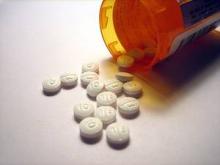The selective serotonin reuptake inhibitor escitalopram rapidly reduces the frequency and severity of hot flashes in menopausal women, according to a report in the Jan. 19 issue of JAMA.
In a multicenter, randomized clinical trial comparing 10 or 20 mg per day of escitalopram with placebo, the drug’s benefit "was only modestly less than that reported in a meta-analysis of estrogen therapy," said Ellen W. Freeman, Ph.D., of the department of obstetrics and gynecology at the University of Pennsylvania, Philadelphia, and her associates.
"Our findings suggest that among healthy women, 10 to 20 mg/day of escitalopram provides a nonhormonal, off-label option that is effective and well tolerated in the management of menopausal hot flashes," they said.
The double-blind trial involved 205 women who were in the menopausal transition, were postmenopausal, or had undergone hysterectomy with one or both ovaries intact. A total of 95 of the women self-reported as African American, 102 as white, and 8 as other. These subjects recorded at least 28 hot flashes or night sweats per week in a daily diary for 3 weeks before enrollment, or hot flashes or night sweats rated as bothersome or severe 4 or more days per week.
The women were randomly assigned to receive oral escitalopram (10 mg) or a matching placebo for 8 weeks. If they did not show a reduction in hot flash frequency or at least a 50% reduction in hot flash severity at 4 weeks, the dose was escalated to 20 mg of active drug or placebo.
At baseline, the mean frequency of hot flashes was 9.78 per day. After 8 weeks, that decreased by nearly half, to 5.26 per day in women taking escitalopram. This reduction was significantly greater than the 33% decrease to 6.43 hot flashes per day in the placebo group.
A total of 55% of women receiving active drug showed a decline of at least 50% in hot flash frequency, compared with 36% of women receiving placebo. Similarly, 19% of the escitalopram group showed a decline of at least 75% in hot flash frequency, compared with only 9% of the placebo group.
Data from the study subjects’ daily diaries showed that every week for the duration of the study, the frequency of hot flashes was significantly decreased in the escitalopram group, compared with the placebo group, Dr. Freeman and her colleagues said (JAMA 2010;305:267-74).
Escitalopram also diminished the severity of hot flashes by 24%, compared with a decrease of 14% with placebo. A total of 70% of women taking the active drug reported satisfaction with treatment, compared with 43% of those taking placebo.
These benefits were consistent across all subgroups of subjects, regardless of the women’s race, menopausal status, depression scores, or anxiety scores.
Treatment response was rapid, with women in the escitalopram group showing significant improvement in hot flash frequency and severity within 1 week of starting treatment, the investigators noted.
The study subjects were followed up about 3 weeks after discontinuing their study medication. Hot flash frequency had rebounded by a significantly greater amount in the escitalopram group (7.18 hot flashes per day) than in the placebo group (6.65 hot flashes per day), as had the severity of hot flashes.
A total of 64% of the women taking escitalopram said they wanted to continue taking their assigned medication, compared with only 42% of those in the placebo group.
"It is noteworthy that women who were not clinically anxious or depressed responded to escitalopram," which suggests that the mechanism underlying the drug’s effect on hot flashes may differ from that underlying its effect in psychiatric conditions. This finding also supports the hypothesis that serotonin receptors play a role in the pathogenesis of hot flashes, Dr. Freeman and her associates said.
Overall, 53% of women taking escitalopram and 63% taking placebo reported newly emergent adverse effects, none of which were serious. Nine women in the escitalopram group and two in the placebo group discontinued treatment because of adverse events, including dizziness, vivid dreams, nausea, and excessive sweating.
Dr. Freeman and her colleagues reported that to their knowledge, their clinical trial is the first to examine whether racial differences exist in response to SSRI treatment for hot flashes. Previous studies have shown that African American women are more likely to report hot flashes than their white counterparts. However, Dr. Freeman found that "race did not significantly affect the response to escitalopram in the present study."


